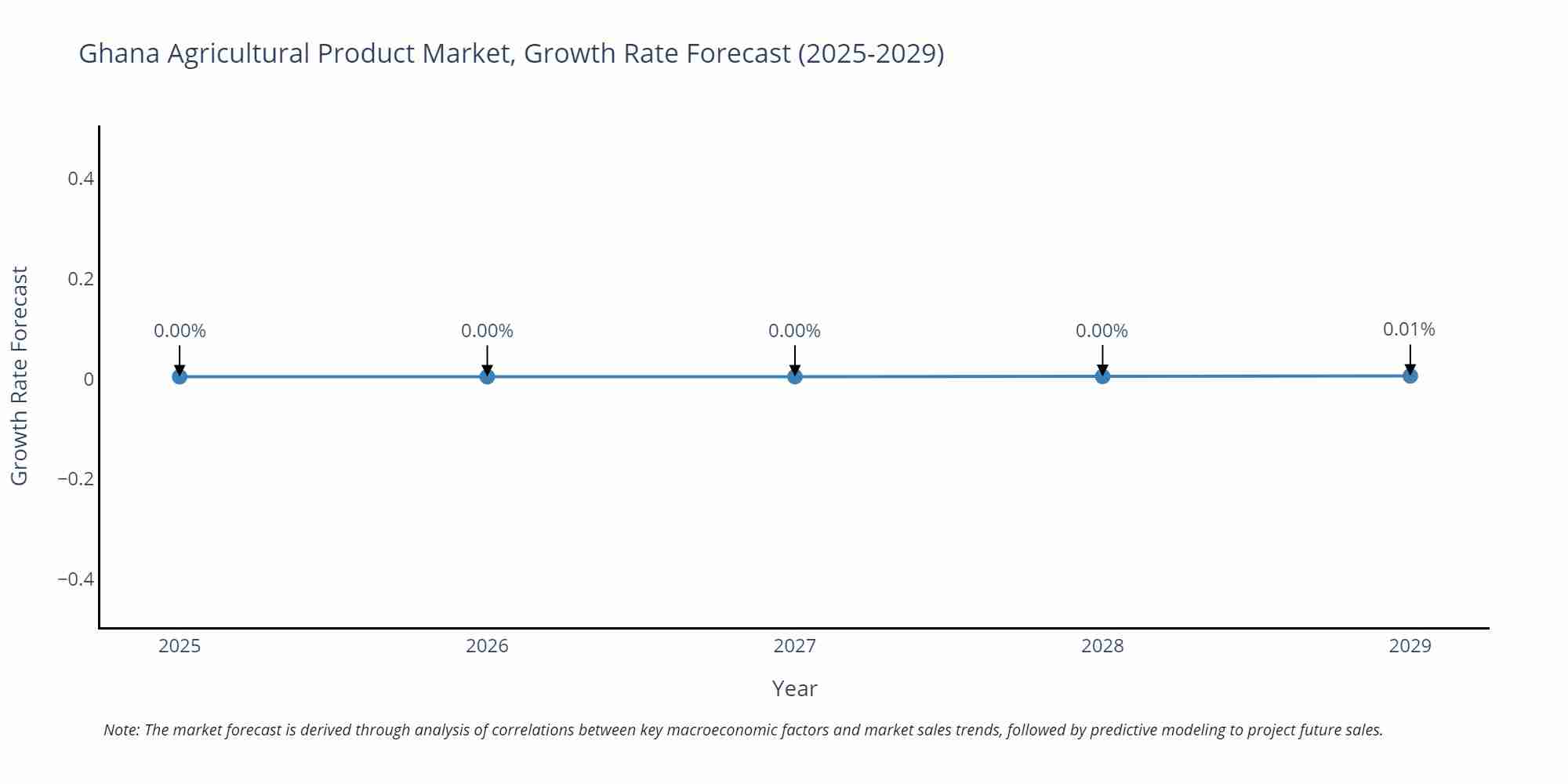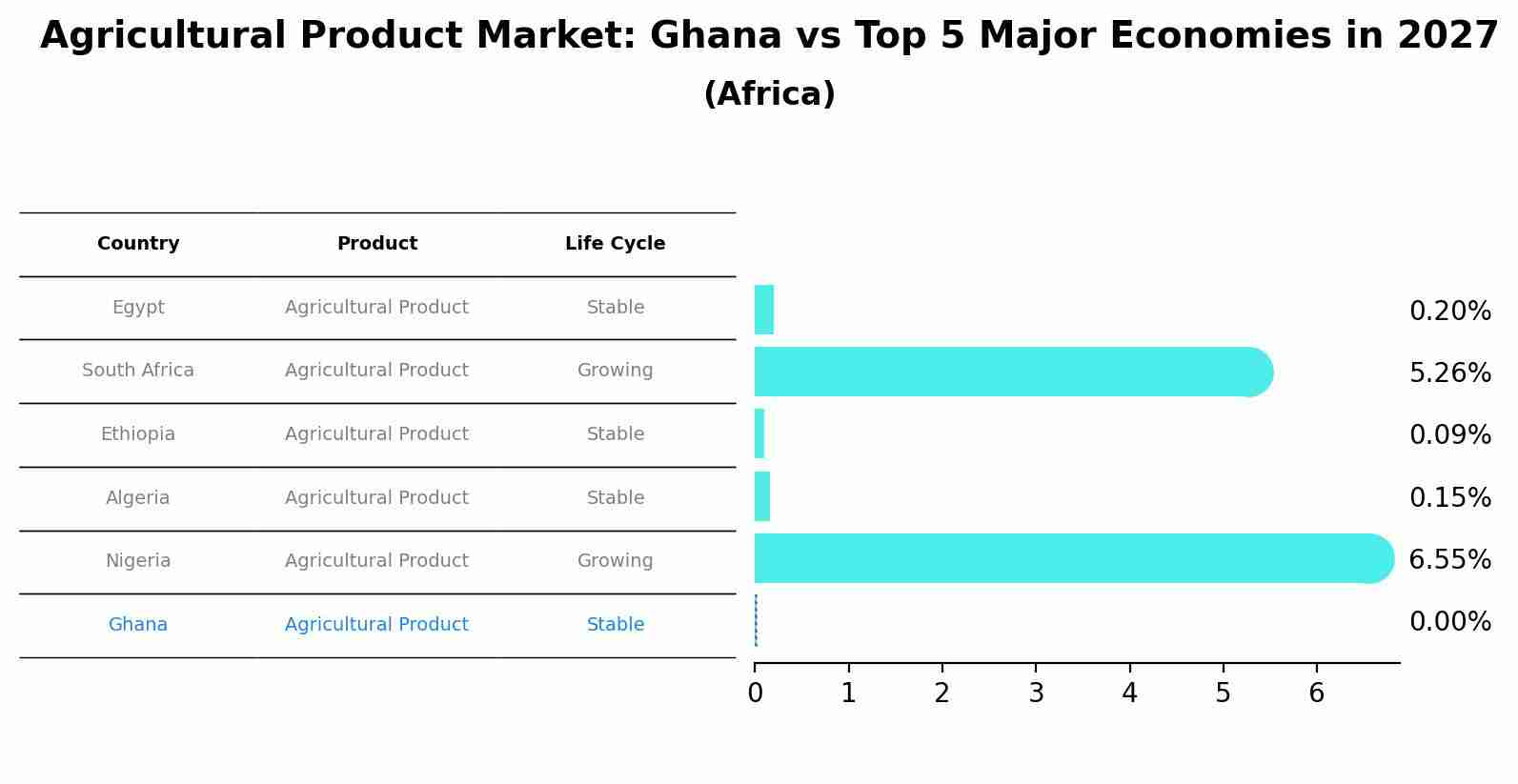Ghana Agricultural Product Market (2025-2031) Outlook | Share, Industry, Value, Growth, Companies, Revenue, Analysis, Size, Trends & Forecast
| Product Code: ETC379676 | Publication Date: Aug 2022 | Updated Date: Jul 2025 | Product Type: Market Research Report | |
| Publisher: 6Wresearch | Author: Dhaval Chaurasia | No. of Pages: 75 | No. of Figures: 35 | No. of Tables: 20 |
Ghana Agricultural Product Market Size Growth Rate
The Ghana Agricultural Product Market is likely to experience consistent growth rate gains over the period 2025 to 2029. The growth rate starts at 0.00% in 2025 and reaches 0.01% by 2029.

Agricultural Product Market: Ghana vs Top 5 Major Economies in 2027 (Africa)
In the Africa region, the Agricultural Product market in Ghana is projected to expand at a stable growth rate of 0.00% by 2027. The largest economy is Egypt, followed by South Africa, Ethiopia, Algeria and Nigeria.

Ghana Agricultural Product Market Synopsis
The Ghana Agricultural Product Market is diverse and robust, with a focus on staple crops such as cocoa, rice, maize, and cassava. Cocoa is a key export product, with Ghana being one of the world`s largest producers. Additionally, the country has a thriving poultry industry and is known for its production of fruits such as pineapple and bananas. The market also includes livestock farming, fisheries, and forestry products. Government initiatives to promote agricultural growth and improve infrastructure have further boosted the sector. However, challenges such as limited access to credit, inadequate storage facilities, and climate change impacts pose obstacles to market expansion. Overall, the Ghana Agricultural Product Market offers opportunities for both domestic consumption and export, with potential for further growth and development.
Ghana Agricultural Product Market Trends
In the Ghana Agricultural Product Market, there is a noticeable shift towards organic and sustainable farming practices as consumers become more health-conscious and environmentally aware. This trend is driving demand for organic fruits, vegetables, and livestock products. Additionally, there is a growing interest in value-added products such as processed foods, snacks, and beverages made from locally sourced ingredients. The government`s initiatives to promote agribusiness and improve infrastructure are also contributing to the market`s growth. Technology adoption is on the rise, with farmers increasingly using digital tools for precision farming, crop monitoring, and market access. Overall, the Ghana Agricultural Product Market is moving towards a more diverse, sustainable, and technology-driven landscape to meet the evolving demands of consumers and global markets.
Ghana Agricultural Product Market Challenges
In the Ghana Agricultural Product Market, some challenges include limited access to financing for smallholder farmers, inadequate infrastructure for transportation and storage leading to post-harvest losses, and inconsistent government policies affecting the sector. Additionally, climate change impacts such as unpredictable weather patterns and droughts pose a threat to crop production. Lack of access to modern agricultural technologies and practices also hinders productivity and competitiveness in the market. Furthermore, market information asymmetry and price volatility make it difficult for farmers to make informed decisions and plan effectively. Addressing these challenges will require concerted efforts from the government, private sector, and development partners to improve the overall sustainability and resilience of the agricultural sector in Ghana.
Ghana Agricultural Product Market Investment Opportunities
Investment opportunities in the Ghana Agricultural Product Market are abundant and diverse. With a growing population, increasing urbanization, and a rising middle class, there is a high demand for a variety of agricultural products such as cocoa, cashew, shea butter, and fruits and vegetables. Opportunities exist in production, processing, and export of these products. Additionally, there is a push for sustainable and organic farming practices, creating opportunities for investors in agribusinesses focused on environmentally friendly practices. The government of Ghana is also actively promoting the sector through various incentives and policies, making it an attractive market for both local and foreign investors looking to capitalize on the country`s rich agricultural resources.
Jordan Agar Market Government Policies
The government of Ghana has implemented various policies to support the agricultural product market, aiming to enhance productivity, ensure food security, and promote economic growth. Some key policies include the Planting for Food and Jobs program, which provides subsidized inputs to farmers to increase production, the One Village One Dam initiative to boost irrigation infrastructure, and the E-agriculture program to promote digital solutions in the agricultural sector. Additionally, the government has prioritized investment in research and extension services, as well as the development of agro-processing industries to add value to agricultural products and create employment opportunities. Overall, these policies are designed to address challenges in the agricultural sector and drive sustainable development in Ghana.
Ghana Agricultural Product Market Future Outlook
The future outlook for the Ghana Agricultural Product Market appears promising, driven by several factors such as increasing government support for the sector, technological advancements in farming practices, and growing consumer demand for locally sourced, organic products. The country`s fertile land and favorable climate provide a strong foundation for agricultural growth, with opportunities for diversification and value addition. Additionally, the rising interest in sustainable agriculture and agro-processing industries is expected to further boost the market. However, challenges such as climate change impacts, access to finance, and infrastructure limitations may pose constraints. Overall, with the right policies and investments in place, the Ghana Agricultural Product Market is likely to experience steady growth and contribute significantly to the country`s economic development.
Key Highlights of the Report:
- Ghana Agricultural Product Market Outlook
- Market Size of Ghana Agricultural Product Market, 2024
- Forecast of Ghana Agricultural Product Market, 2031
- Historical Data and Forecast of Ghana Agricultural Product Revenues & Volume for the Period 2021 - 2031
- Ghana Agricultural Product Market Trend Evolution
- Ghana Agricultural Product Market Drivers and Challenges
- Ghana Agricultural Product Price Trends
- Ghana Agricultural Product Porter's Five Forces
- Ghana Agricultural Product Industry Life Cycle
- Historical Data and Forecast of Ghana Agricultural Product Market Revenues & Volume By Type for the Period 2021 - 2031
- Historical Data and Forecast of Ghana Agricultural Product Market Revenues & Volume By Food for the Period 2021 - 2031
- Historical Data and Forecast of Ghana Agricultural Product Market Revenues & Volume By Fiber for the Period 2021 - 2031
- Historical Data and Forecast of Ghana Agricultural Product Market Revenues & Volume By Fuel for the Period 2021 - 2031
- Historical Data and Forecast of Ghana Agricultural Product Market Revenues & Volume By Raw Material for the Period 2021 - 2031
- Historical Data and Forecast of Ghana Agricultural Product Market Revenues & Volume By Application for the Period 2021 - 2031
- Historical Data and Forecast of Ghana Agricultural Product Market Revenues & Volume By Direct Consumption for the Period 2021 - 2031
- Historical Data and Forecast of Ghana Agricultural Product Market Revenues & Volume By Food & Fabrics for the Period 2021 - 2031
- Historical Data and Forecast of Ghana Agricultural Product Market Revenues & Volume By Construction & Paper Products for the Period 2021 - 2031
- Historical Data and Forecast of Ghana Agricultural Product Market Revenues & Volume By Others for the Period 2021 - 2031
- Historical Data and Forecast of Ghana Agricultural Product Market Revenues & Volume By Industry Vertical for the Period 2021 - 2031
- Historical Data and Forecast of Ghana Agricultural Product Market Revenues & Volume By Food & Nutrition for the Period 2021 - 2031
- Historical Data and Forecast of Ghana Agricultural Product Market Revenues & Volume By Sustainable Agribusiness for the Period 2021 - 2031
- Historical Data and Forecast of Ghana Agricultural Product Market Revenues & Volume By Production & Harvesting for the Period 2021 - 2031
- Historical Data and Forecast of Ghana Agricultural Product Market Revenues & Volume By Agribusiness Technological Inputs for the Period 2021 - 2031
- Historical Data and Forecast of Ghana Agricultural Product Market Revenues & Volume By Others for the Period 2021 - 2031
- Ghana Agricultural Product Import Export Trade Statistics
- Market Opportunity Assessment By Type
- Market Opportunity Assessment By Application
- Market Opportunity Assessment By Industry Vertical
- Ghana Agricultural Product Top Companies Market Share
- Ghana Agricultural Product Competitive Benchmarking By Technical and Operational Parameters
- Ghana Agricultural Product Company Profiles
- Ghana Agricultural Product Key Strategic Recommendations
Frequently Asked Questions About the Market Study (FAQs):
- Single User License$ 1,995
- Department License$ 2,400
- Site License$ 3,120
- Global License$ 3,795
Search
Thought Leadership and Analyst Meet
Our Clients
Related Reports
- Afghanistan Apparel Market (2026-2032) | Growth, Outlook, Industry, Segmentation, Forecast, Size, Companies, Trends, Value, Share, Analysis & Revenue
- Canada Oil and Gas Market (2026-2032) | Share, Segmentation, Value, Industry, Trends, Forecast, Analysis, Size & Revenue, Growth, Competitive Landscape, Outlook, Companies
- Germany Breakfast Food Market (2026-2032) | Industry, Share, Growth, Size, Companies, Value, Analysis, Revenue, Trends, Forecast & Outlook
- Australia Briquette Market (2025-2031) | Growth, Size, Revenue, Forecast, Analysis, Trends, Value, Share, Industry & Companies
- Vietnam System Integrator Market (2025-2031) | Size, Companies, Analysis, Industry, Value, Forecast, Growth, Trends, Revenue & Share
- ASEAN and Thailand Brain Health Supplements Market (2025-2031) | Strategy, Consumer Insights, Analysis, Investment Trends, Opportunities, Growth, Size, Share, Industry, Revenue, Segments, Value, Segmentation, Supply, Forecast, Restraints, Outlook, Competition, Drivers, Trends, Demand, Pricing Analysis, Competitive, Strategic Insights, Companies, Challenges
- ASEAN Bearings Market (2025-2031) | Strategy, Consumer Insights, Analysis, Investment Trends, Opportunities, Growth, Size, Share, Industry, Revenue, Segments, Value, Segmentation, Supply, Forecast, Restraints, Outlook, Competition, Drivers, Trends, Demand, Pricing Analysis, Competitive, Strategic Insights, Companies, Challenges
- Europe Flooring Market (2025-2031) | Outlook, Share, Industry, Trends, Forecast, Companies, Revenue, Size, Analysis, Growth & Value
- Saudi Arabia Manlift Market (2025-2031) | Outlook, Size, Growth, Trends, Companies, Industry, Revenue, Value, Share, Forecast & Analysis
- Uganda Excavator, Crane, and Wheel Loaders Market (2025-2031) | Strategy, Consumer Insights, Analysis, Investment Trends, Opportunities, Growth, Size, Share, Industry, Revenue, Segments, Value, Segmentation, Supply, Forecast, Restraints, Outlook, Competition, Drivers, Trends, Demand, Pricing Analysis, Competitive, Strategic Insights, Companies, Challenges
Industry Events and Analyst Meet
Whitepaper
- Middle East & Africa Commercial Security Market Click here to view more.
- Middle East & Africa Fire Safety Systems & Equipment Market Click here to view more.
- GCC Drone Market Click here to view more.
- Middle East Lighting Fixture Market Click here to view more.
- GCC Physical & Perimeter Security Market Click here to view more.
6WResearch In News
- Doha a strategic location for EV manufacturing hub: IPA Qatar
- Demand for luxury TVs surging in the GCC, says Samsung
- Empowering Growth: The Thriving Journey of Bangladesh’s Cable Industry
- Demand for luxury TVs surging in the GCC, says Samsung
- Video call with a traditional healer? Once unthinkable, it’s now common in South Africa
- Intelligent Buildings To Smooth GCC’s Path To Net Zero


















